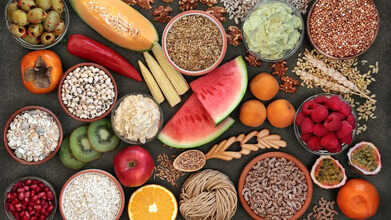- Health Conditions A-Z
- Health & Wellness
- Nutrition
- Fitness
- Health News
- Ayurveda
- Videos
- Medicine A-Z
- Parenting
- Web Stories
Does Sleeping After You Eat Actually Make You Fat?

Image Credits: Canva
For decades, we’ve been told to keep atleast a 2-4 hour gap between eating and sleeping, warned that heading straight to bed after a meal leads to weight gain and many other health complications. This age-old fact has shaped our eating habits, making us question whether late-night dining inevitably adds extra pounds. Many of us have wondered—does the timing of our meals truly affect our weight, or is it just about calorie balance? While metabolism slows at night, our bodies continue to burn calories, challenging the notion that eating before bed alone causes weight gain. So, is this rule fact or just another health myth?
For years, the idea that sleeping after eating leads to weight gain has been widely debated. Some think that sleeping soon after a meal makes the body hold on to extra fat, but is there actually some scientific basis to it? While timing does seem to affect digestion, weight gain is largely caused by overall calorie intake and lifestyle instead of when you consume your meals. Let's go further into the facts to see if sleeping after eating actually leads to weight gain and how sleep patterns affect body weight.
Weight gain is simply a function of taking calories in excess of what the body expends. Whether they are consumed at breakfast or after midnight, extra intake results in storage calories as fat. One pound of body weight has a caloric equivalent of about 3,500 calories. If you eat only 250 more calories every day, you might gain half a pound a week, no matter at what time you take those calories.
The majority of individuals believe that metabolism greatly decreases while you are sleeping, causing weight gain from eating late at night. Metabolism does not halt when we sleep. Although it will decrease a bit from what it is during active times, the body still burns calories for basic functions like breathing, circulation, and repairing cells. Therefore, consuming food at night does not necessarily result in weight gain unless it leads to the intake of more calories than required on a daily basis.
What Sleep's Role in Weight Control?
While consuming food prior to bedtime doesn't automatically lead to weight gain, a bad sleeping pattern may lead to weight gain. Research in the Sleep journal in 2010 concluded that those who slept less than five hours or more than eight hours each night were at risk of weight gain. This implies that the quality and amount of sleep may influence metabolism and appetite.
Poor sleep throws hunger hormones off kilter, including ghrelin and leptin. Ghrelin triggers appetite, whereas leptin informs fullness. Losing sleep heightens production of ghrelin and drowns out levels of leptin, triggering bigger appetites and an even better chance to eat excessively throughout the day. Should you find that you're feasting later at night due to sleep deprivation, it might not only be because you're dining so late in the day.
Late-Night Food and Eating Choices
Although a pre-bedtime snack will not necessarily cause weight gain, what you consume matters. Most late-night snackers choose to indulge in nutrient-poor, high-calorie foods like chips, candy, and fast food. In a 2011 Northwestern University study, people who went to bed late and consumed late-night snacks took in 248 extra calories daily compared to people who went to bed early. Those extra calories, which tended to be from foods of little nutritional value, caused weight gain.
Also, consuming huge amounts of sugary or fatty foods at bedtime will interfere with digestion, causing discomfort, acid reflux, and bad sleep. This can, subsequently, influence metabolism and energy levels the next day, potentially resulting in heightened cravings for unhealthy foods.
How to Manage Weight When Eating Late?
If eating near bedtime fits your schedule, there are tips for healthier foods that won't undermine your weight control efforts:
Select Nutrient-Rich Foods: Eat complete foods like lean proteins, greens, whole grains, and unsaturated fats. These are full of nutrients without a lot of calories.
Mange Portions: Don't binge by having an even, small-sized meal as opposed to gorging yourself on a lot of calories-packed food.
Limit Refined and Sweet Foods: Refining and sweet foods can create a spike in insulin, and the body tends to store fat and disrupt sleep.
Stay Properly Hydrated: Oftentimes, thirst is confused with hunger. Water or tea can avoid unhealthy late-night grazing.
Establish a Consistent Sleeping Schedule: Keeping a consistent bed and wake-up time each day can regulate metabolism and appetite.
To be a healthy weight without sacrificing dinner, try these workable tips:
Eat Smaller, More Frequent Meals: Replace three huge meals with four to five small meals spread over the course of the day to maintain metabolism levels and avoid being too hungry in the evening.
Plan Ahead: Meal prepping healthy dinners can prevent impulsive fast-food choices. Preparing grilled chicken, steamed vegetables, and brown rice in advance ensures a balanced meal is ready when needed.
Be Mindful of Emotional Eating: Stress and boredom can trigger unnecessary snacking, especially late at night. Engage in relaxation techniques such as reading, meditation, or light stretching to curb emotional cravings.
Avoid Sleeping Too Close to Bedtime: Provide your body with a minimum of 1-2 hours to digest food before going to bed to avoid discomfort and possible acid reflux.
Does Sleeping After Eating Really Make You Fat?
The notion that sleeping after eating causes weight gain is a myth. Although metabolism does decrease somewhat during sleep, the main culprit in weight gain is overall calorie consumption and not the timing of meals. But unhealthy sleep patterns, late-night eating, and a general diet that is not healthy can lead to weight gain in the long run.
If you do end up late-night eating, emphasize portion size and nutrient intake over skipping meals. Rather than worrying about what time you eat, stress maintaining a balanced diet, regular sleeping schedule, and active lifestyle for overall health and weight control.
Is The Viral Wellness Trend ‘Fibremaxxing’ Helping Or Harming Your Gut?

Credits: CANVA
Tiktok fibremaxxing wellness trend: There is no shortage of wellness trends online that claim to transform your health, but a new one has taken over social media with a focus on gut health. It’s called “fibremaxxing,” and its premise is simple: eat more fibre to improve digestion, metabolism, immunity, and lower the risk of disease. On TikTok and Instagram, the trend often appears as colourful lentil bowls, chia puddings, and smoothies loaded with leafy greens and flaxseeds. But how much of this viral trend is actually backed by science?
The idea of increasing both soluble and insoluble fibre isn’t new, yet fibremaxxing has made it trendy again—and this time, for good reason. Fibre is vital to everyday health, supporting everything from steady blood sugar to regular bowel movements. Here’s what experts say about this growing movement and why fibre truly matters.
What Is Fibremaxxing?
Fibremaxxing is a social media movement that encourages people to boost their fibre intake by adding more fruits, vegetables, legumes, and whole grains to every meal. The goal is to improve digestion, promote fullness, and support long-term health. According to Dr. Urvi Shah, a board-certified hematologist-oncologist and physician at Memorial Sloan Kettering Cancer Center, the concept behind fibremaxxing is largely rooted in scientific evidence. Dr. Shah, who is leading multiple studies on high-fibre plant-based diets, notes that the approach aligns well with established nutrition research.
Is ‘Fibremaxxing’ Good Or Bad For Your Gut?
High-fibre diets are consistently linked to a wide range of health benefits, from lowering the risk of heart disease, diabetes, and colon cancer to aiding weight control and gut function. That’s why Dr. Shah believes fibremaxxing gets several aspects right.
She explains that including a wide variety of plant-based, high-fibre foods is essential because “different fibre types feed different microbes.” A diverse diet helps nurture a balanced microbiome. She adds that the trend’s emphasis on whole foods rather than processed or fibre-enriched items is a major plus. “Whole plants provide fibre, polyphenols, and micronutrients that work together to support the gut,” she says. Prebiotic-rich foods also help shape a healthier microbiota and increase the production of beneficial short-chain fatty acids like butyrate, which has “anti-inflammatory and anti-cancer effects.”
Simply put, upping your fibre intake through natural, unprocessed foods, rather than supplements, can make a real difference to gut health.
What’s The Daily Recommended Amount of Fibre Intake?
Experts suggest that adults should consume between 25 and 30 grams of fibre each day. Men typically require more (around 38 grams), while women need about 25 grams. These numbers can vary depending on age, sex, and calorie intake, but a general guideline is 14 grams of fibre for every 1,000 calories eaten, according to Harvard Health.
How To Add Fibre To Your Diet?
Plant-based foods are the easiest way to increase your fibre intake, this could mean starting your morning with oats or simply adding more vegetables to your meals. Dietitian Laura Tilt notes that several everyday foods are surprisingly high in fibre:
- Rolled porridge oats – 4.5g per 50g (half cup)
- Canned chickpeas – 7g per half can
- Seeded bread – 5g per two slices
- Canned lentils – 6g per half can
- Frozen peas – 4.5g per 80g (3 tbsp)
- Frozen raspberries – 5.5g per 80g (3 tbsp)
- Wholemeal pasta – 6.5g per 75g serving
- Dried apricots – 3g per 3–4 pieces
- Reduced salt/sugar baked beans – 7.5g per half can
- Mixed milled seeds (flax, pumpkin, chia) – 4.5g per 25g
Is Fibremaxxing Helpful?
There’s no doubt fibre plays an essential role in maintaining good health. But like any nutrient, too much of it can cause problems if not balanced properly. A sudden surge in fibre intake without enough water can lead to bloating, gas, constipation, dehydration, or even trigger IBS symptoms. Over-focusing on fibre might also cause you to overlook other nutrients your body needs. The key is moderation, fibre is beneficial, but it works best as part of a balanced, varied diet.
Why Cant I Digest Milk, But Can Easily Eat Yogurt?

Credits: Canva
If you landed here, the reason is that you are also someone who cannot tolerate milk, but loves yogurt, and are probably wondering why is that?
The logic is that if you have lactose intolerance, you won't be able to digest any dairy product, but with yogurt, your life is easy. The answer lies in the components of the two various dairy products that come from the same source.
Why Can't You Digest Milk?
The reason is because you are lactose intolerant. This is a condition that makes it hard to digest the sugar in milk and milk products, called lactose. People with lactose intolerance could have diarrhea, gas and bloating after they consume milk. While this condition is usually harmless, it can cause discomfort.
This happens because the enzymes in the small intestine, called lactase is responsible for lactose intolerance. If someone has too low levels of lactase, the person can become lactose intolerant.
The small intestine and colon are parts of the digestive tract, which processes the foods you eat. The intestine pull out nutrients from the food and whatever is not absorbed by the intestines continues along the digestive tract and is expelled as stool during a bowel movement.
But Why Can You Digest Yogurt, If You Cannot Digest Milk?
The answer to this lies in the fermentation process that turns milk into curd and breaks down much of the lactose, which is the sugar, that is often difficult to digest. The probiotic bacteria used to make curd contain their own lactase, which helps in the breakdown of lactose, and this can further help with digestion even for those who do not produce enough lactase on their own.
Furthermore, during fermentation, the bacteria in curd, called the Lactobacillus bulgaricus and Streptococcus thermophilus convert lactose into lactic acid, which is easier for the body to process. This helps your body to digest curd easily over milk. Since the bacteria contains lactase, which the milk lacks, some people may find it easier to digest curd or yogurt over milk.
The bacterial cells also physically protect their lactase, and it can work to break down the lactose from the curd as it passes through the digestive system.
Why Is Curd Gut-Friendly?
The key to a healthy gut health is lactobacillus, a kind of probiotic, which helps in digestion, suppression of disease-causing bacteria and treats constipation. It also is beneficial in treating irritable bowel syndrome. It breaks down sugar into lactic acid.
A study by a Bhubaneswar-based professor Balamurugan Ramdas also revealed that Bengal or Odisha's popular breakfast Panta Bhaat, which includes fermented cooked rice, also releases the same bacteria, that fermented milk releases and so it contains short-chain fatty acids, which are responsible for improving gut health and boosting immunity.
Furthermore, curd is known to balance the gut flora, probiotics improve digestion, and the absorption of nutrition. They also help in the breakdown of food, reducing issues like bloating, gas, and constipation. The probiotics in curd can help restore the natural balance in your gut, which can soothe an upset stomach and alleviate discomfort from indigestion. A healthy gut is closely linked to a strong immune system, and the probiotics in curd help to boost gut health, which in turn can enhance immunity.
Sourdough vs Regular Bread: Which One Is Actually Better For Your Gut?

Credits: Canva
Bread is a staple across most diets, but not all loaves are made the same. In recent years, sourdough has gained a reputation for being the “healthier” bread—praised for its tangy flavour, natural fermentation, and supposed benefits for digestion. But how much of this is true? Here’s what experts and studies reveal about how sourdough compares to regular bread in terms of health and nutrition.
What Makes Sourdough Different
Unlike most commercial breads that rely on baker’s yeast for quick rising, sourdough is made using a natural starter—a mixture of flour and water that ferments over several days. This starter contains wild yeast and lactic acid bacteria, which break down carbohydrates and gluten during fermentation.
According to the Harvard T.H. Chan School of Public Health, this slow fermentation process increases the bioavailability of nutrients like folate and magnesium while producing organic acids that give sourdough its characteristic tang. In contrast, regular white or whole wheat bread undergoes a much faster process, often with added yeast, sugar, and preservatives to speed up production.
Easier on Digestion
One of sourdough’s biggest advantages lies in how it affects the gut. The fermentation process partially breaks down gluten, making it easier for some people to digest compared to conventional bread.
A 2021 review published in the journal Food Microbiology found that lactic acid bacteria in sourdough can help reduce compounds called FODMAPs—a group of carbohydrates known to trigger bloating and discomfort in people with irritable bowel syndrome (IBS). This makes sourdough a potentially gentler option for sensitive stomachs, though it’s not suitable for those with celiac disease.
Better Blood Sugar Control
Another reason nutritionists often recommend sourdough is its effect on blood sugar levels. The acids produced during fermentation slow down the rate at which glucose is released into the bloodstream.
Research published in the Journal of Cereal Science noted that sourdough bread has a lower glycemic index (GI) than regular white or whole wheat bread. This means it causes a slower, more stable rise in blood sugar, something especially beneficial for people with diabetes or insulin resistance.
Nutrient Profile and Shelf Life
While both sourdough and regular bread contain similar calories and macronutrients, sourdough tends to have slightly higher levels of antioxidants and minerals because of the fermentation process. It also naturally resists mould growth, allowing it to stay fresh longer without artificial preservatives.
As per Cleveland Clinic dietitians, choosing whole-grain sourdough offers the best nutritional value, combining the fibre of whole wheat with the gut-friendly benefits of fermentation. On the other hand, refined white breads offer little fibre and are often fortified artificially.
The Bottom Line
Sourdough is not a miracle food, but it does stand out as a healthier and more digestible alternative to most commercial breads. Its fermentation process not only enhances flavour and texture but also supports gut health and stable blood sugar levels.
If you enjoy bread and want to make a more wholesome choice, opt for an artisanal or homemade sourdough made with whole grains and minimal additives. As nutrition experts often say, the real key is balance, pair your bread with fibre, protein, and healthy fats for a meal your gut (and taste buds) will thank you for.
© 2024 Bennett, Coleman & Company Limited

